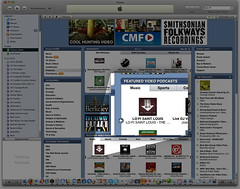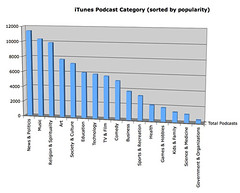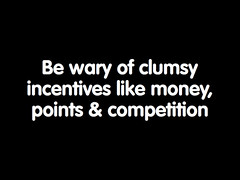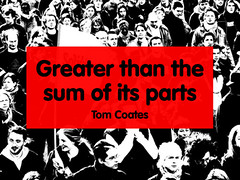
Featured Video Podcast in iTunes!!, higres version
Bill Streeter of lofistl.com was featured today in the iTunes podcast directory.
And he got some good PR.
riverfronttimes.com | Best Of
Congrats Bill.
This blog is still and maybee always will be in alpha. There is no strict editorial direction at this time, but it's likely to be rantings and ravings about technology, design, art, culture and especially all things new media.

This is Steve Garfield reporting from the Soho Grand Hotel where Nokia has gathered bloggers from around the world to preview the new Nokia N95, prior to it's public unveiling tomorrow in NYC at the 7th Regiment Armory.
[...]
There was an application called podcasting and I asked about it. It's a media aggregator that will be able to subscribe to audio and video podcasts which you'll then be able to watch on the device. It's really a lot more than just a phone. It's a multimedia computer.
 Haven't seen any stats on the number of podcasts recently and was pleasantly suprised to see a podcaster (Victor Cjiao of typicalmacuser.com) went through and totaled up all the numbers in the iTunes podcast directory.
Haven't seen any stats on the number of podcasts recently and was pleasantly suprised to see a podcaster (Victor Cjiao of typicalmacuser.com) went through and totaled up all the numbers in the iTunes podcast directory. Apple Computer has slappedPodcast Ready with a "cease and desist" letter, claiming that the terms "Podcast Ready" and "myPodder" infringe Apple's trademarks, and that they cause confusion among consumers. The company has been cracking down on use of the word "pod" by all sorts of parties, even though its trademark is for the word "iPod."
Podcast Ready CEO Russel Holliman said he'd consider dropping the name myPodder if he had to, but "Podcast Ready"? If that's infringement, Apple is claiming that it owns the word "podcast." Sure, the word originated with the word iPod, but most people now see it as a general term for downloadable audio shows that isn't affiliated with one brand more than another.
Coincidentally, Apple's letter arrived the day before Podcast Ready unveiled a new version of its software -- one that works with the iPod.
Podcast Ready works by sucking down subscribed podcasts directly to a portable device whenever that device is connected to a computer. This allows you to update your player's podcasts on any computer, instead of just the one running, say, your iTunes software. The latest version of the program works better with iTunes because it adds freshly-downloaded podcasts to your iPod's navigation database without you having to import the podcasts into iTunes first.
 From a presentation by Tom Coates, Greater than the sum of its parts
From a presentation by Tom Coates, Greater than the sum of its parts  .
.UNESCO, The United Nations Educational, Scientific and Cultural Organization, is launching a call for submissions of video podcast proposals for a series of production grants.The organization wishes to produce and distribute a series of video podcasts for all audiences, but especially young adults (20-35), aimed at increasing understanding of the development and societal issues identified as priority fields by UNESCO, namely:
- Human Rights;
- Peace;
- Tolerance;
- Fight against discrimination, based on race, gender or other issues (e.g. HIV status);
- Millennium Development Goals, particularly poverty-alleviation and gender equality and women empowerment;
- Freedom of Expression;
- Intercultural communication.
Last year Williams wrote a widely read, much-bookmarked post titled ?Ten Rules for Web Startups.? ?Be Narrow,? he said, ?Be Tiny.? Today, he flat-out admitted ?I was working on Odeo at the time I wrote that, and I was ignoring most of those rules.? Incited by excitement about podcasting and an early demo at the TED Conference leading to a front-page New York Times article (behind pay wall), Odeo got unfocused and bloated, according to Williams.
Williams went through a tidy list of the top five Odeo screw-ups:
?Trying to build too much? ? Odeo set out to be a podcasting company with no focus beyond that.
?Not building for people like ourselves? ? For example, Williams doesn?t podcast himself, and he says as a result the company?s web-based recording tools were too simplistic.
?Not adjusting fast enough? ? The company thought its comprehensive web-based strategy would win out over the competition, primarily Apple, in the long term. ?It turns out long term is not soon enough for a startup if you?re trying to get a foothold.?
?Raising too much money too early? ? Williams seeded the money with $70,000 of his own money, and after the TED excitement added another $100,000. After he tied up over a million in angel funding, a term sheet came through from Charles River Ventures at three times the angel round valuation. They took the money.
?Not listening to my gut? ? ?When you?ve got a bunch of money and you?ve hired a lot of people and you?re talking to your board and you?re talking to reporters, your gut can get drowned out.?
Rushkoff on Videoblogging
Ok, so I'm always talking about the failure of Current TV, and the great potential to build a new media network for the internet age, like what CNN was for the age of cable and satelite. I thought I should quote a little source on this. So when I stumbled on this little interview Johnny Golstein did with Douglas Rushkoff I thought I'd post it. Vloggersations at their finest.
More below.










"Rushkoff on Videoblogging"
Watch movie (Quicktime, 4.5 min, 17.8 MB)
Original post, from jonnygoldstein.com:
Watch the video I recently had the pleasure of speaking with bestselling writer Douglas Rushkoff about his latest projects "Get Back in the Box," and "Testament." At the end of our interview, I couldn't help asking him for his take on videoblogging.
So what is "the failture of Current TV" and what is "this future media network"? My opinion might vary from Douglas Rushkoff's a bit, but the failure of Current TV in my opinion that they had the opportunity and certainly hyped the idea of making a user generated channel. A true participatory medium. However when it came right down to it and they created the Current TV cable channel they used the same old top down editorial mechanism used for the last half a decade.
Instead of encouraging people to create their own channels, find their own voices... and create a sustainable and decentralized ecosystem of media and then filtering or aggregating the very best of that media Current TV became just another "contest".
The difference is while one is sustainable and empowers users giving them their own platforms on which to speak and their own audience.... the other says... make us videos... and maybe if their really really good... you'll have a one in 10,000 shot of them being actually seen by another real human being.
Current TV didn't connect the mases, empower them and give them a voice and hence profit from the huge cornicopia of creativity. What they did was create another MTV. It's the same old s*** with a new label. Send us your best stuff and maybe we'll put it on TV... maybe it'll be seen.
Real change is not a new marketing angle... real change depends on architectural change. Ted Turner of CNN fame understood that the change in architecture from broadcast TV to cable and satelite would allow him to do something revolutionary. Today CNN doesn't seem that revolutionary. There are thousands of niche cable channels. But when Ted Turner started CNN with the idea of having 24x7 around the clock news people literrally thought he was a kook. He stood amongst the giants of NBC and ABC and said I want to do 24x7 news. It's hard to imagine that time. But amongst those generalists who at the time would have thought that there would be enought people in the world interested in just news?
Who want's to watch 24x7 around the clock news!?
The anwer to that was pretty much the entire world.
Well right now I pose you this riddle.
Who want's to watch high school girls talking about their latest crush on crappy quality web cam?
Who want's to see an old man tell his life story?
Who want's to see videos of a guy walking down the street talking into a camera on his way to the grocery store?
Well, believe it or not I already know the answer to that.
The answer is their friends, their family, and their peers.
And when you consider that everyone has friends, family, and peers doesn't that litterally mean that the potential audience for such a network is pretty much everyone in the whole world?
You bet your ass it does.
So is youtube this network of the future? Is videoblogging this network of the future?
[About youtube] I don't know. But I don't think so, for one thing this network can't be owned. I think they're pieces of the puzzle.
This network can not be incorporated like CNN. Sure parts of it can.. and maybe Youtube is one part of that... maybe. But it can't be owned because it's made up of people, not just one class of people... but eventually and ideally pretty much everyone on the planet.. Noone can own this network, the capacity of this network is not determined by pipes and bandwidth. It's capacity is litterally determined by the capacity of the people themselves. Their interest. Their passion. The number of friends, family and peers they have. Their ability to be the filters and propogaters of media for those friends, family, and peers around them.
The internet is a vastly different network than cable or satelite. And so much like the kooky visionary that decided people would be interested in watch the news 24x7. I believe that yes..the world does want to watch the ramblings of everyday ordinary people. And why not, they being everyday ordinary people themselves have a LOT in common.
As Francois Truffaut said... and as has been cited enclessly by vloggers.
"The film of tomorrow appears to me as even more personal than an individual and autobiographical novel, like a confession, or a diary. The young filmmakers will express themselves in the first person and will relate what has happened to them. It may be the story of their first love or their most recent; of their political awakening; the story of a trip, a sickness, their military service, their marriage, their last vacation...and it will be enjoyable because it will be true, and new...The film of tomorrow will not be directed by civil servants of the camera, but by artists for whom shooting a film constitutes a wonderful and thrilling adventure. The film of tomorrow will resemble the person who made it, and the number of spectators will be proportional to the number of friends the director has. The film of tomorrow will be an act of love." — François Truffaut, published in Arts magazine, May 1957 Source: Miami New Times
(video via Mefeedia)
National Geographic is Video Podcasting
In case you haven't noticed National Geographic is video podcasting. Quite frankly they are some of the best quality and most interesting podcasts I've ever seen. The vision of bringing that same exotic look into world cultures is alive and better than ever. Video podcasting seems to me a natural extention of the vision of those first national geographic magazines to use pictures. It's an interesting point of perspective with 100's of thousands of videobloggers on youtube and throughout the web. To me these videos illustrate how far we have yet to go before the world truely becomes the global village so talked about in the past. THey're a far cry from teenage girls sitting in their bedrooms talking about their secrete crush or viral videos of people lipsyncing lyric to crazy pop tunes.
"Unusual Food: Fried Rat"
Watch movie (Quicktime, , )
Original post, from National Geographic Video Shorts:
The thought of eating rats would be disgusting to many people, but there are areas of the world where a grilled rat is considered a yummy treat.
(Via Mefeedia)
Blackberry or Crackberry?
A bit of media zen from the medianipple. It just made me laugh. Reminds me of breakfast cerial.
Have you had your crackleberry cerial today? :)





"addiction to technology"
Watch movie (Quicktime, 1.1 min, 5.8 MB)
Original post, from Media Nipple - Visual Communication:
BlackBerry or CrackBerry? These five videos look at how technology and addiction is often presented in broadcast media. Addiction is bad of kids, but good for adults? (Click image - and links below - to view Quicktime video.) This post will not address the realities of technological addiction – if there even is such a thing – and instead we ask these questions: Why is addiction always fearfully presented when describing adolescent usage? And why is addiction always presented like some funny naughty habit with adults? On TV, adult media addiction is like chocolate. If there is tech-addiction, isn’t it bad for everyone? If we believe that kids should not be immersed in technology for extended periods, why is it funny when adults exhibit these same obsessions? One thing is true, if there is no legal stand for adult tech-addiction, there will also be none for kids. And why should there be? The main purpose of media is to self-promote. Media begets more media. And addiction begets more addiction. Go buy some more, who can resist? Consider visual literacy and grow better media communication. tags: VLOG visual LITERACY television MEDIA communication CULTURE
(Via Mefeedia)
Videoblogging, is it art?
Better Bad News takes on videoblogging.










"Better Bad News: ARTISTS, PROGRAMERS AND ACTIVISTS CONSIDER A GENERAL STRIKE: BUT IS IT ART?"
Watch movie (Quicktime, 5.6 min, 17.6 MB)
Original post, from The ReVlog:
vlog: http://www.betterbadnews.com feed: http://www.betterbadnews.com/rss20_xml comment: http://www.betterbadnews.com/65
(Via Mefeedia)
One day we?ll be able to follow the conversation from blog post to blog post and comment to comment across the entire blogosphere.
I see co.mments future as a tracker and aggregator of conversations.
As of yet the conversation still exists in the BBS?s the About.com?s and on in the comments of sites like NYTimes. however the blogosphere and services like co.mmments will gradually gobble these old corporate hierchies up and allow the reorganization of conversation in brilliant new ways. One of which is that conversations will no longer be tied to the brand or corporation?s domain space which sponsored them. Words and comments from all over the web and hence world will intermingle in natural threads. You?ll have only to favor or filter your favorite places of discussion wether that be slashdot and metafilter, or your favorite blogs?. and filter by language? or even geography to see what people are saying near you.
Threaded conversations like tagging, and trusted models like blogging (before them) will become a major new facet aka. dimension of the internet.